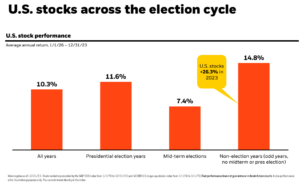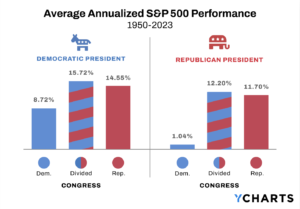A few years ago, if you inherited an IRA from a parent, the distribution rules were simple: you could stretch withdrawals over your life expectancy. Since, the rules for non-spouses inheriting retirement accounts have been anything but straightforward. Starting in 2020, most new beneficiaries of retirement accounts were subject to a 10 year rule. This was widely interpreted to mean required minimum distributions (RMDs) were gone, and instead, beneficiaries must take the entire sum within 10 years. However, in early 2022, the IRS proposed changes that would require some beneficiaries to take RMDs and empty the account in 10 years. A final ruling is still forthcoming – the IRS has waived penalties for certain beneficiaries through 2024.
The news should come as a welcome reprieve for many. For those who have not yet considered planning strategies around inherited IRA distributions, now is the time.
IRS updates timeline for ruling on inherited IRA distributions
The IRS released Notice 2024-35 in April 2024, waiving penalties for certain inherited retirement account beneficiaries for missed required minimum distributions again in 2024 that would have been necessary under the 2022 proposed guidance.
Since even this clarification sounds confusing, let’s start from the beginning.
Summary of inherited IRA distribution rule changes since the Secure Act
Before 2020: Pre Secure Act
The ‘stretch IRA’ was alive and well. Most non-spouse beneficiaries who inherit any type of IRA, or a defined contribution plan such as a 401(k) or 403(b) could choose to withdraw the funds by taking required minimum distributions over their lifetime. Beneficiaries would calculate their life expectancy according to their current age in the IRS’ uniform lifetime table.
Important note: the passing of the Secure Act or any subsequent changes do not impact existing beneficiaries who inherited a retirement account before 2020. Those individuals can continue to stretch distributions over their lifetime.
January 2020: Secure Act provisions in effect (widely accepted guidance at the time)
The Secure Act created two classes of designated non-spouse beneficiaries: eligible designated beneficiaries (not subject to the 10-year rule) and non-eligible designated beneficiaries. This article focuses on the distribution rules for non-eligible designated beneficiaries as that is most common.
Based on widespread interpretation of the Secure Act, it was originally assumed that when a decedent dies after January 1st, 2020, a non-spouse beneficiary (non-eligible designated beneficiary) must empty the retirement account by the end of the 10th year following the year of death and there would be no RMDs.
For reference, a non-spouse eligible designated beneficiary includes minor children of the account owner until age 21, disabled or chronically ill individuals, and individuals not more than 10 years younger than the account owner.
February 2022: IRS proposes changes to Secure Act inherited IRA RMD rules
In early 2022, the IRS issued proposed guidance that stunned the financial community. As drafted, the changes would impact non-eligible designated beneficiaries by requiring distributions in years one through nine in addition to withdrawing all the funds in year 10, but only if the decedent was subject to RMDs when they died.
Distributions during the 10-year window would generally be based on the beneficiary’s own single life expectancy according to the IRS’ Uniform Lifetime Table, reduced by one each year.
What the initial IRS proposal did not seek to change:
- Existing post-Secure Act guidance for beneficiaries who inherited a retirement account from a non-spouse who died before reaching their required beginning date (also called RMD age). As of the writing of this article, those beneficiaries would still refer to the widely accepted guidance section above.
- Changes wouldn’t apply to individuals who died (at any age) before 2020 or between spouses.
- Post Secure Act distribution rules for beneficiaries of Roth IRAs, as Roth IRAs don’t have RMDs (Roth 401(k)s do until 2024). However, non-eligible designated beneficiaries would still need to take all the funds within the 10-year window.
October 2022: IRS waives penalties for beneficiaries who missed RMDs based on proposed guidance
The IRS released Notice 2022-53 announcing final regulations will be forthcoming and will apply (at earliest) to the 2023 distribution year. Individuals affected by the new rules who ‘failed’ to take RMDs in 2021 and 2022 will not be subject to ordinary penalties.
July 2023: IRS extends inherited IRA RMD penalty waiver for 2023
The penalty waiver extends to 2023 for those who may be affected by the still-pending guidance. Starting in 2023, the penalty for a missed required minimum distribution is 25%, down from 50% before 2023.
In the release, the IRS said they expect to release final guidance in 2024.
April 2024: IRS extends inherited IRA RMD penalty waiver for 2024
The penalty waiver extends to 2024 for those who may be affected by the still-pending guidance. In the release, the IRS said they expect to release final guidance before 2025.
What to Do When a Parent Dies and You’re the Executor
Planning strategies for inherited IRAs and retirement accounts
Regardless of whether potential changes to the inherited IRA distribution rules may impact you, consider planning strategies to help mitigate the tax impact.
Pre-tax contributions to an IRA, 401(k), or 403(b) will be fully taxable to the beneficiary as regular income once distributed. So some heirs will experience major changes to their tax situation if forced to take a large distribution from an inherited retirement account.
But the good news is the delay offers more time to consider several planning strategies that may be available, for example:
- Accelerating distributions during low-tax years
- Converting an inherited 401(k) to an inherited Roth IRA
- Planning distributions around college financial aid applications or Medicare premiums
- State tax considerations and residency changes
The bottom line: if you’ve inherited a retirement account from a parent or relative, consider working with your financial and tax advisor to assess your situation and stay on top of changes ahead.
Article written by Darrow Wealth Management President Kristin McKenna, CFP® and originally appeared on Forbes.










